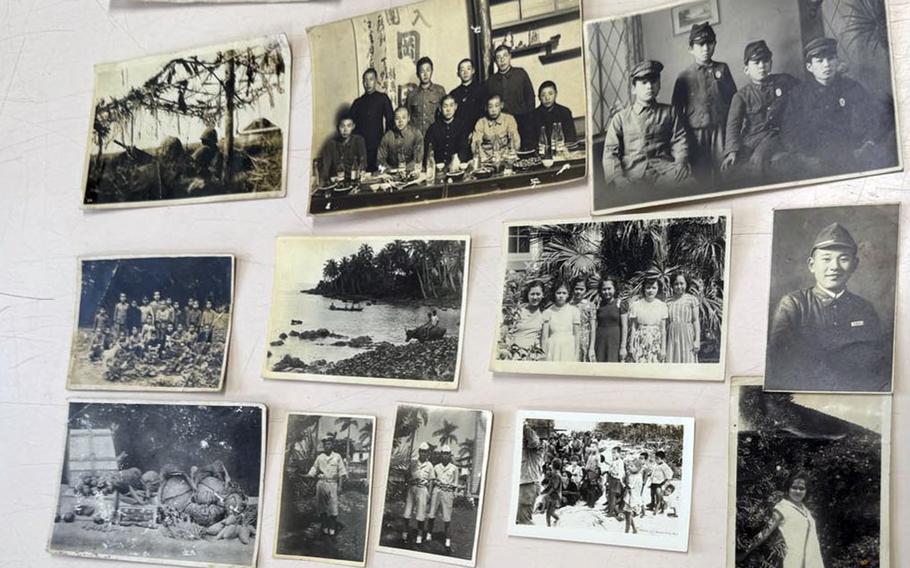Asia-Pacific
‘The right thing to do’: Marine’s son returns mementos collected during Battle of Okinawa
Stars and Stripes September 3, 2024

These images were collected during World War II's Battle of Okinawa by the late Marine Corps Sgt. Casimir Joseph Cichon. (Cichon family)
CAMP FOSTER, Okinawa — Lt. Col. Patrick Cichon wanted to personally return Japanese mementos his father collected while serving during World War II’s Battle of Okinawa, but he didn’t have much time.
Cichon, a physician, commands the California Air National Guard’s 129th Medical Group, which deployed to Okinawa for two weeks in July. He carried with him the items he found in 2005 in a wooden chest belonging to his father, Marine Corps Sgt. Casimir Joseph Cichon: two cloth sacks, a towel and two displays of postcards and photographs the younger Cichon had framed.
With help from Staff Sgts. Joe Pagan and Austin Harvill of the 163rd Attack Wing’s public affairs office, Cichon handed over the postcard and photo displays to the Okinawa Prefecture Peace Memorial Museum’s curator, Katsuya Nakahodo, and director, Sayuri Maekawa, on July 20.
With help from Nakahodo and the U.S. Consulate General in Naha, the empty sacks were later given to the Japan Air Self-Defense Force, and the towel was returned to the Gunma Prefectural Museum, according to a July 26 wing news release.
“We like to have closure for our soldiers and our people in our lives, and I kind of felt the same way,” Cichon said by phone Aug. 27. “I think it’s the right thing to do if you can give somebody closure on this part of their life.”
In total, the museum received 20 photos, 35 letters and a bankbook, Nakahodo said by phone Friday.
“We do not clearly know if the photos were taken in Okinawa. Looking at the vegetation, they might be from the Nanyo Islands [south of Japan] or the Philippines,” he said. “But many Okinawans were there during the war, so we received them because it might be related to Okinawa.”
The museum will display the items in a temporary exhibition held “every one or two years” for recently collected artifacts but will not permanently display them to protect them from moisture damage, Nakahodo said. Items may be returned to the families if the museum can find them.
“These items are valuable because they tell us how it was in that era. We can know more about that era,” Nakahodo said.
The two sacks during the war held care packages known as “imonbukuro.” They were turned over to Maj. Yoshiaki Hijioka of the Air Self-Defense Force, he said by phone Aug. 28.
“Omama Agricultural School,” now Omama High School, was embroidered on the towel, along with the name of an insurance company, Daiichi Conscription Insurance, said Toshikuni Sekiguchi, assistant curator of Gunma Prefectural Museum of History, by phone Aug. 28.
The school and the museum cannot receive or display the towel because it “had the name of an individual and they might have problems with the family,” he said. The museum is working to find the family.
The process of returning the items was “not easy and not simple,” Pagan said.
“If we were working a regular schedule there, this would have taken two months,” he said in a video call Aug. 28.
Cichon has deep ties to Japan. He served with the Army Reserve at Camp Zama from 1988 to 1992, while also working for two Japanese engineering companies. He speaks Japanese and has a Japanese spouse.
Cichon’s father collected the Japanese items during the Battle of Okinawa “partially to preserve them and partially as mementos,” Cichon said.
The elder Cichon, who died in 1992 at age 70, served from 1942 to 1947, and like many WWII veterans could be hesitant to talk about the war, Cichon said.
“He would at times, I guess, have outbursts that he would tell you about what happened in the war — about his buddy being blown up on the beach and his buddy’s arm landing on him,” Cichon said. “Or he would tell you stories about how the Japanese were very ferocious and they wouldn’t surrender, and they would sometimes, he said, play possum with pretending they were dead, and you’d roll them over and they’d throw a grenade at you — things like that.”
While he had limited time to find the right places to return the items, Cichon said he was glad he was able to connect with the Okinawa museum.
“With everything that’s going on in the world and in the Pacific theater, it’s important for us to look beyond the borders of our country to understand and have an interest in what goes on in the world and try to build a better world,” Cichon said. “I think it’s my way of contributing to that and trying to build good relations.”